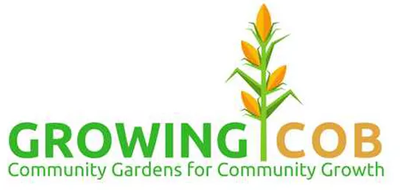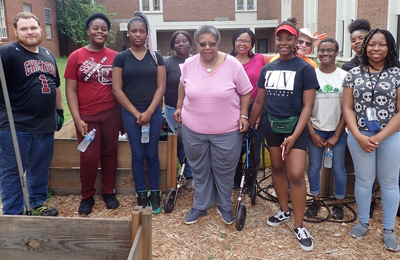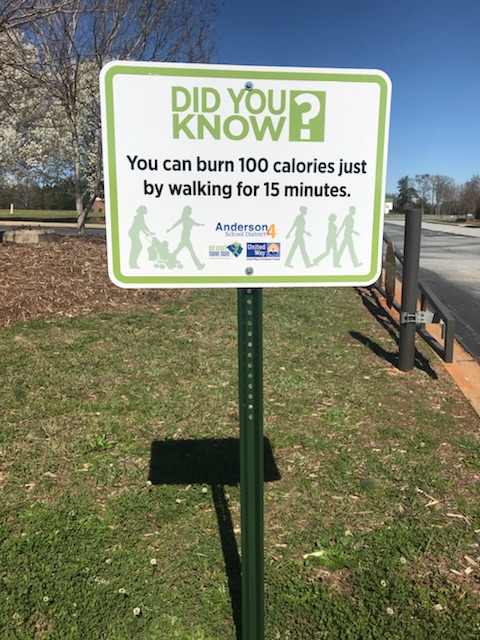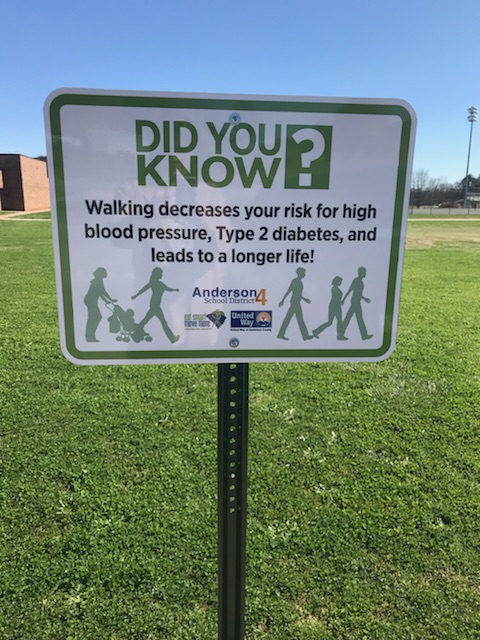
Jun 6, 2019 | Impact, Mini-Grant Projects, News
By SHAKORA BAMBERG T&D Correspondent
 Growing Calhoun, Orangeburg, Bamberg believes in tomorrow and is on a mission to improve the health of the community, low-income households and schools through access to sustainable gardens, fresh food and education.
Growing Calhoun, Orangeburg, Bamberg believes in tomorrow and is on a mission to improve the health of the community, low-income households and schools through access to sustainable gardens, fresh food and education.
Growing COB was founded in December 2017 when End Child Hunger, a group out of the University of South Carolina Arnold School of Public Health, reached out to leaders in the community to start an Orangeburg chapter. Discussions showed there was an interest in starting a community garden. After meeting for a few months and bringing on new members, the group decided to expand its outreach to Calhoun and Bamberg counties.

One of the group’s projects is the Orangeburg County Community Garden located at South Carolina State University, which opened on Oct. 13, 2018. Every Wednesday, organizers give away free produce from the garden to community members. Jamison’s Pharmacy in Orangeburg serves as the food hub, and hundreds of people show up to get fresh, local produce.
“We started the garden when we were awarded funds from Eat Smart Move More South Carolina from their Let’s Go 3.0 grant in August 2018. We were able to receive funds to start the garden through the Tri-County Health Network and the Regional Medical Center, our fiscal agents,” a press release from Growing COB states.
The staff of Orangeburg County has supported Growing COB through the donation of multiple compost bins and additional resources.
Those who’d like to volunteer in the community garden can sign up at the following link: https://m.signupgenius.com/#!/showSignUp/70a094daaaf28a6ff2-winter
The organization to date has been fortunate to partner with the following:
- Bamberg County Community Rural Art Works League
- Caring Always Matters Foundation
- Clemson Extension
- Eat Smart Move More SC
- Jamison’s Pharmacy
- Orangeburg Consolidated School District 4
- Orangeburg County
- Orangeburg County Library, Orangeburg Branch
- Orangeburg County Soil & Water Conservation District
- South Carolina Department of Health and Environmental Control
- South Carolina State University, Department of Biological & Physical Sciences, Environmental Action Group
- Small Business Development Center
- Southeastern Housing & Community Development
- Regional Medical Center
- Tri-County Health Network
- USC Arnold School of Public Health
In the past, Growing COB partnered with the Smart Box Food Pantry and Amazing Grace Ministries to distribute water in Denmark. They’ve also held spaghetti dinner fundraisers to help sustain the garden.
To keep up with the organization’s activities, follow Growing COB on Facebook.
To learn more about Growing Calhoun, Orangeburg, Bamberg, visit the website: https://growingcob.wixsite.com/scfoodaccess.
Members of the organization meet monthly at various locations in Calhoun, Orangeburg and Bamberg counties. Those who would like to attend the meetings are asked to email GrowingCOB@gmail.com.

Nov 19, 2018 | Impact, News
 Eat Smart Move More South Carolina has approved nine grants in its first Let’s Go! 3.0 grant cycle to community coalitions seeking to provide residents with access to local healthy options.
Eat Smart Move More South Carolina has approved nine grants in its first Let’s Go! 3.0 grant cycle to community coalitions seeking to provide residents with access to local healthy options.
Eat Smart Move More Allendale County is reactivating the Allendale County Healthy Young People Empowerment (HYPE) Project Team to plan, create, and promote a safe walking path that will allow Town of Allendale residents to access the local grocery store and farmer’s market. Youth will educate and mobilize other youth to become engaged in the pedestrian planning process and to advocate for social changes that are necessary to have the citizens of Allendale County make active living a priority in their lives.
Tri-County Health Network in Orangeburg is partnering with South Carolina State University and the Regional Medical Center to create two self-sustaining, organic community gardens. The gardens will continue the momentum and success of five establish school gardens and fight food deserts. Produce will be given to patients of a local pharmacy and used in the Regional Medical Center’s Diabetes Prevention Program cooking class.
Eat Smart Move More Richland County is revitalizing and enhancing two parks in Columbia – Crane Creek Park and Lorick Park. Fun Fitness Station stencils will be painted on walking tracks, making walking more interactive and fun. Health events will be hosted at the parks to educate neighborhood residents and community centers on the importance of physical activity and to encourage them to use the revitalized parks.
Eat Smart Move More Kershaw County is increasing access to the Kershaw County Farmer’s Market by creating way-finding signage. The market relocated to downtown Camden, and the signage will help residents and visitors find the market.
Eat Smart Move More Barnwell County is building a disc golf course in the Town of Williston. Residents indicated a need for family-friendly physical activity resources in the town. In addition, the Healthy Young People Empowerment (HYPE) Project Team will make improvements to walking tracks in the towns of Williston and Blackville by cleaning up the areas, painting lines, and landscaping. They will also advocate for an open community policy at the Williston walking track, and clean up the Williston-Elko Middle School playground.
The Alliance Collaborative in Horry County is working with the Horry County School District to adopt and implement the South Carolina School Boards Association’s model policy for open community use. The policy allows community residents to use outdoor playgrounds, tracks, courts and other outdoor recreational facilities located on school property.
Eat Smart Move More Anderson County is working with the Healthy Young People Empowerment (HYPE) Project Team to continue making Equinox Park in Anderson accessible to all residents, especially those with disabilities and special needs. Youth will help create a play space where all ages and abilities can play, learn, and explore the outdoors together, and interact with one another. The HYPE team will add two interactive sensory play panels installed at an appropriate height for wheelchair accessibility. The panels will be located near the Born Learning Trail and a shelter that will have an inclusive picnic table, grill, a solid paved pad with an access path.
Partners for Active Living in Spartanburg is installing a water bottle refilling station and drinking fountain at the trailhead of the River Birch Trail. The bottle filling station will be located on the edge of Spartanburg School District 7 property and will also serve community members visiting or using nearby athletic fields that are open to the public during non-school hours. The station features a convenient way to grab tap water to go and includes a handicapped-accessible fountain, as well as a ground-level drinking fountain for dogs.
Shady Grove Baptist Church in Greenville is fighting food deserts by expanding and enhancing an existing community garden to provide fresh produce for older members of the church, church members having financial problems, and those in need in the community.
ESMMSC will be awarding more community grants over the next two-and-a-half years to help community coalitions in South Carolina identify and address barriers to healthy eating and active living. In January and July of each year, coalitions will be able to apply for mini-grants to fund small-scale projects. The grants are made possible through funding by The BlueCross® BlueShield® of South Carolina Foundation, an independent licensee of the Blue Cross and Blue Shield Association.
For more information about the Let’s Go 3.0 initiative, visit www.eatsmartmovemoresc.org. To find healthy resources in your community, visit www.letsgosc.org.

May 15, 2018 | Impact, Mini-Grant Projects, News
KELSEY ALLEN, MPH, CHES
 “To see a child who doesn’t have what their little heart cries out for, that’s what saddens me. There needs to be something for those children. We need to have something to serve those with disabilities in our community,” says City of Laurens Councilwoman Sylvia Douglas.
“To see a child who doesn’t have what their little heart cries out for, that’s what saddens me. There needs to be something for those children. We need to have something to serve those with disabilities in our community,” says City of Laurens Councilwoman Sylvia Douglas.
Councilwoman Douglas first brought up the idea of having inclusive play equipment in the City of Laurens 10 years ago. At that time and until this year, there was no play equipment like this in the City of Laurens. One of the barriers that she was facing in seeing this move forward was cost.
According to Councilwoman Douglas, hospitality tax can often offset the cost of this equipment as it is a draw for parents of children with special needs, who live outside of the city, to bring their children to use the City of Laurens parks. Today, she is thrilled to know that there is a now a swing for children with physical disabilities at Little River Park in Laurens. It is her hope and intention that there will be more to come.
“I think this shows that we are enlightened to this issue and we are looking out for this part of our community,” she says.
Brie Holmes, Chair of the Eat Smart Move More Laurens County, is also excited for this wonderful resource to now be available in Laurens.
“Opportunities for physical activity should not be exclusive to those without physical limitations or special needs. Inclusion and accessibility should be included in every discussion around our built environment, playgrounds especially. Healthy adults start as healthy children, and healthy children get outside and play! Every child deserves that opportunity.”
Creating change in our communities is possible with perseverance and partnership. This would not have been possible without the support of the mayor and city council of Laurens. Additionally, the city administrator, the Laurens County Disabilities and Special Needs Board, and ESMM Laurens County also supported this project. If you feel passionate about seeing these types of changes in your community, be encouraged that change often doesn’t happen quickly, but it is certainly possible.
Thank you, Councilwoman Douglas and the rest of the City of Laurens for this great addition to the parks!

Apr 17, 2018 | Impact, Mini-Grant Projects, News
Kelsey Allen, MPH, CHES
Manager for Community Initiatives
 Sit and wait. That’s the usual routine for parents and guardians of car riders at most schools. Dropping off and picking up children takes a lot of time, especially for parents who like to get there early. Listening to the radio or catching up on social media burns time, but there’s a healthier alternative in Anderson School District 4.
Sit and wait. That’s the usual routine for parents and guardians of car riders at most schools. Dropping off and picking up children takes a lot of time, especially for parents who like to get there early. Listening to the radio or catching up on social media burns time, but there’s a healthier alternative in Anderson School District 4.
Because Anderson School District 4 is a health-conscience school district, personnel had the bright idea of encouraging parents to get out of their cars and spend that precious wait time walking. How much more active would that make parents? How much of a good influence would it be on the children to see their parents out walking when they leave school for the day?
With this in mind, Anderson School District 4 partnered with Eat Smart Move More (ESMM) Anderson County and the United Way of Anderson County to create and post signage that encourages parents to get out and walk during this time of day. ESMM Anderson County was one of six communities selected to receive funding from ESMM South Carolina over a three-year period, through a grant from the BlueCross BlueShield of South Carolina Foundation, an independent licensee of the Blue Cross and Blue Shield Association. Using these funds,  ESMM Anderson County purchased and installed signs at schools in Anderson School District 4.
ESMM Anderson County purchased and installed signs at schools in Anderson School District 4.
Five different signs prompting Did You Know questions and answers were created:
- Walking one mile can burn almost 100 calories.
- Walking one mile a day can improve your mental health, boost your mood, and make you feel more alert.
- You can burn 100 calories just by walking for 15 minutes.
- Walking decreases your risk for high blood pressure, Type 2 diabetes, and leads to a longer life!
- Small changes make a big difference. Stop idling and get active!
Since the installation of the signs, school personnel have observed parents moving more during the pick-up wait time. School and community cultures of health are built on small steps such as these that encourage healthy behaviors, raise awareness, and decrease barriers. The partnership between ESMM Anderson County and Anderson School District 4 is a great example of two entities with a common goal can work together and come up with a creative solution. Here’s to a healthier District 4 and Anderson County!
![SC Communities to Benefit from Healthy Eating, Active Living Grant]()
Mar 23, 2018 | Impact, Mini-Grant Projects, News
 The BlueCross BlueShield of South Carolina Foundation, an independent licensee of the Blue Cross and Blue Shield Association, has awarded Eat Smart Move More South Carolina (ESMMSC) $800,000 over the next three years to support Let’s Go 3.0, which will increase the capacity of community coalitions in South Carolina to identify and address barriers to healthy eating and active living. Coalitions will be able to apply for mini-grants to fund small-scale projects that are needed to help catapult their healthy eating and active living initiatives.
The BlueCross BlueShield of South Carolina Foundation, an independent licensee of the Blue Cross and Blue Shield Association, has awarded Eat Smart Move More South Carolina (ESMMSC) $800,000 over the next three years to support Let’s Go 3.0, which will increase the capacity of community coalitions in South Carolina to identify and address barriers to healthy eating and active living. Coalitions will be able to apply for mini-grants to fund small-scale projects that are needed to help catapult their healthy eating and active living initiatives.
“Over the past several years, we’ve noticed that community change doesn’t always require large sums of money,” says Beth Franco, Executive Director of ESMMSC. “Many communities in South Carolina, particularly our small, rural, or economically vulnerable communities, can leverage small amounts of money to make a significant impact on the health of their community. We believe that these mini-grant opportunities will be a key factor in making sustainable changes and improving lifestyle choices.”
The application process will be open to community coalitions that need assistance in implementing policy, systems, and environmental changes that will increase access to healthy, affordable foods and safe places to be physically active. The mini-grants, ranging from $1,000 to $5,000, can be used to implement projects, such as adding bike racks downtown, beautifying neighborhood parks or trails, or supporting local farmers’ markets.
South Carolina has the 12th highest adult obesity rate in the nation (32.3%) and the eighth highest obesity rate for high schoolers (16.3%). Current trends nationwide and in South Carolina show rates beginning to stabilize, suggesting that obesity-prevention efforts over the past decade are beginning to pay off.
“The next few years will be critical to ensure that the progress we’ve seen continues and our collective accomplishments are not undermined,” said Franco. “Through this grant, we’ll be able to help close the gap in many communities and increase opportunities for residents to make healthy choices.”
ESMMSC staff will continue to provide training and support to local coalitions to strengthen their capacity to make lasting community change. ESMMSC’s work with community coalitions currently reaches 36 counties, covering 93% of the state’s population. Recent trainings and reports have included topics like disability inclusion, grant writing, race equity, and the economic impact of active communities.
For more information about the Let’s Go 3.0 initiative, visit our Let’s Go! Grants page or contact Kelsey Allen at kelsey@eatsmartmovemoresc.org. To find healthy resources in your community, visit www.letsgosc.org.

 Growing Calhoun, Orangeburg, Bamberg believes in tomorrow and is on a mission to improve the health of the community, low-income households and schools through access to sustainable gardens, fresh food and education.
Growing Calhoun, Orangeburg, Bamberg believes in tomorrow and is on a mission to improve the health of the community, low-income households and schools through access to sustainable gardens, fresh food and education.





